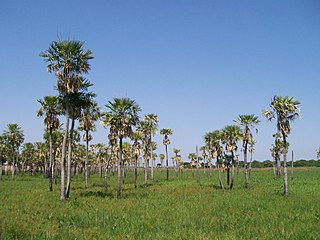The Abipones were an indigenous peoples of Argentina's Gran Chaco, speakers of one of the Guaicuruan languages. They ceased to exist as an independent ethnic group in the early 19th century. A small number of survivors assimilated into Argentine society.

Chaco, officially the Province of Chaco, is one of the 23 provinces in Argentina. Its capital and largest city, is Resistencia. It is located in the north-east of the country.
The Toba people, also known as the Qom people, are one of the largest indigenous groups in Argentina who historically inhabited the region known today as the Pampas of the Central Chaco. During the 16th century, the Qom inhabited a large part of what is today northern Argentina, in the current provinces of Salta, Chaco, Santiago del Estero, Formosa and the province of Gran Chaco in the southeast of the Department of Tarija in Bolivia. Currently, many Toba, due to persecution in their rural ancestral regions, live in the suburbs of San Ramón de la Nueva Orán, Salta, Tartagal, Resistencia, Charata, Formosa, Rosario and Santa Fe and in Greater Buenos Aires. Nearly 130,000 people currently identify themselves as Toba or Qom. With more than 120,000 Qom living in Argentina, the Qom community is one of the largest indigenous communities in the country.

Guaycuru or Guaykuru is a generic term for several ethnic groups indigenous to the Gran Chaco region of South America, speaking related Guaicuruan languages. In the 16th century, the time of first contact with Spanish explorers and colonists, the Guaycuru people lived in the present-day countries of Argentina, Paraguay, Bolivia, and Brazil.
Guaicuruan is a language family spoken in northern Argentina, western Paraguay, and Brazil. The speakers of the languages are often collectively called the Guaycuru peoples. For the most part, the Guaycuruans lived in the Gran Chaco and were nomadic and warlike, until finally subdued by the various countries of the region in the 19th century.

Mataguayo–Guaicuru, Mataco–Guaicuru or Macro-Waikurúan is a proposed language family consisting of the Mataguayan and Guaicuruan languages. Pedro Viegas Barros claims to have demonstrated it. These languages are spoken in Argentina, Brazil, Paraguay, and Bolivia.
Toba Qom is a Guaicuruan language spoken in South America by the Toba people. The language is known by a variety of names including Toba, Qom or Kom, Chaco Sur, and Toba Sur. In Argentina, it is most widely dispersed in the eastern regions of the provinces of Formosa and Chaco, where the majority of the approximately 19,810 speakers reside. The language is distinct from Toba-Pilagá and Paraguayan Toba-Maskoy. There are also 146 Toba speakers in Bolivia where it is known as Qom and in Paraguay where it is also known as Qob or Toba-Qom.

Spanish is the language that is predominantly understood and spoken as a first, or second language by nearly all of the population of the Republic of Argentina. According to the latest estimations, the population is currently greater than 45 million.
Pilagá is a Guaicuruan language spoken by 4,000 people in the Bermejo and Pilcomayo River valleys, western Formosa Province, in northeastern Argentina.
Vilela is an extinct language last spoken in the Resistencia area of Argentina and in the eastern Chaco near the Paraguayan border. Dialects were Ocol, Chinipi, Sinipi; only Ocol survives. The people call themselves Waqha-umbaβelte 'Waqha speakers'.
Eastern Bolivian Guaraní, known locally as Chawuncu or Chiriguano (pejorative), is a Guaraní language spoken in South America. In Bolivia 33,670 speakers were counted in the year 2000, in the south-central Parapeti River area and in the city of Tarija. In Argentina, there were approximately 15,000 speakers, mostly in Jujuy, but also in Salta Province, and 304 counted in the Paraguayan Chaco.

The Charruan languages are a group of languages once spoken in Uruguay and the Argentine province of Entre Ríos. In 2005 a semi-speaker of Chaná language was found.

Argentines are people identified with the country of Argentina. This connection may be residential, legal, historical or cultural. For most Argentines, several of these connections exist and are collectively the source of their being Argentine.
The Intercontinental Dictionary Series is a large database of topical vocabulary lists in various world languages. The general editor of the database is Bernard Comrie of the Max Planck Institute for Evolutionary Anthropology, Leipzig. Mary Ritchie Key of the University of California, Irvine is the founding editor. The database has an especially large selection of indigenous South American languages and Northeast Caucasian languages.
The Republic of Paraguay is a mostly bilingual country, where both Spanish, an Indo-European language in the Romance branch, and Guaraní, an indigenous language of the Tupian family, have official status.
Maskoy, or Toba-Maskoy, is one of several languages of the Paraguayan Chaco called Toba. It is spoken on a reservation near Puerto Victoria. Toba-Maskoy is currently a threatened language at risk of becoming an extinct language, due to the low number of native speakers.





